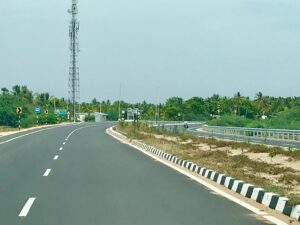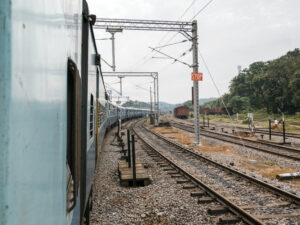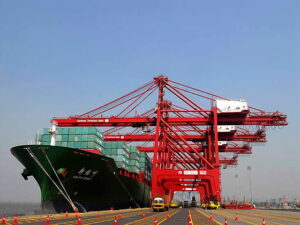INFRASTRUCTURE FINANCE UPDATE | JANUARY, 2023
 The infrastructure finance update for the month of January 2023 primarily focuses on three sectors, namely, railways, roads and highways, and ports. The last month’s news coverage also focuses on the large number of infrastructure projects being delayed, amongst which road transport and highways have the maximum number of late projects. According to a government estimate, some 835 infrastructure projects in the core sector are behind schedule. The road, transportation, and highways sector have the most delayed projects in the nation, according to the most recent flash report from the Infrastructure and Project Monitoring Division (IPMD). The Ministry of Statistics and Programme Implementation is responsible for the IPMD. It keeps track of the progress of projects with budgets over Rs. 150 crores. The Road Transport and Highways sector has 428 delayed projects, according to the IPMD December 2022 report, followed by 117 in the Railways, 88 in the Petroleum sector, 36 in coal, 55 in power, 27 in water resources, 4 in Health and Family Welfare, 15 in urban development, 24 in civil aviation, and many other sectors. These 1,438 projects have a total initial implementation cost of Rs 20, 35,794.75 crores, and their estimated completion costs are going to reach Rs 24, 86,069.52 crores. This demonstrates that there is a Rs 4, 50,274.77 crore cost overrun. The IPMD said in a statement that, of the 1438 projects, 8 are ahead of schedule, 253 are on schedule, 835 are delayed, 343 reported cost overrun, and 165 reported both times and cost overrun relative to their initial project implementation timelines.
The infrastructure finance update for the month of January 2023 primarily focuses on three sectors, namely, railways, roads and highways, and ports. The last month’s news coverage also focuses on the large number of infrastructure projects being delayed, amongst which road transport and highways have the maximum number of late projects. According to a government estimate, some 835 infrastructure projects in the core sector are behind schedule. The road, transportation, and highways sector have the most delayed projects in the nation, according to the most recent flash report from the Infrastructure and Project Monitoring Division (IPMD). The Ministry of Statistics and Programme Implementation is responsible for the IPMD. It keeps track of the progress of projects with budgets over Rs. 150 crores. The Road Transport and Highways sector has 428 delayed projects, according to the IPMD December 2022 report, followed by 117 in the Railways, 88 in the Petroleum sector, 36 in coal, 55 in power, 27 in water resources, 4 in Health and Family Welfare, 15 in urban development, 24 in civil aviation, and many other sectors. These 1,438 projects have a total initial implementation cost of Rs 20, 35,794.75 crores, and their estimated completion costs are going to reach Rs 24, 86,069.52 crores. This demonstrates that there is a Rs 4, 50,274.77 crore cost overrun. The IPMD said in a statement that, of the 1438 projects, 8 are ahead of schedule, 253 are on schedule, 835 are delayed, 343 reported cost overrun, and 165 reported both times and cost overrun relative to their initial project implementation timelines.
Roads & Highways:
According to the Economic Survey 2023, there has been a considerable increase in the construction of National Highways (NHs)/roads, with 10,457 km created in FY22 compared to 6,061 km in FY16. It stated that total financial assistance for investment in the road transportation industry has been substantially expanding during the last four years. InvIT, a public sector asset monetisation platform launched by the National Highways Authority of India in FY22, raised more than Rs 10,200 crore from renowned foreign and domestic institutional investors (up to Dec 2022).
 On February 12, 2023, the Sohna-Dausa section of the Delhi-Mumbai Expressway will open, cutting the travel time between Delhi and Jaipur to two hours. The two cities are at a distance of 270 km. The upcoming Delhi-Mumbai Expressway’s first stretch connects Dausa in Rajasthan, whose capital is Jaipur, with Sohna in Haryana.
On February 12, 2023, the Sohna-Dausa section of the Delhi-Mumbai Expressway will open, cutting the travel time between Delhi and Jaipur to two hours. The two cities are at a distance of 270 km. The upcoming Delhi-Mumbai Expressway’s first stretch connects Dausa in Rajasthan, whose capital is Jaipur, with Sohna in Haryana.
Gujarat would receive an additional Rs 12,600 crore from the government for the building of highways, bridges, and logistic parks in the state. In addition to Rs 1,000 crore for the construction of Road Over Bridges (ROBs) or Road Under Bridges (RUBs) on roads other than national highways across the state, this fund would contain Rs 6,000 crore for the development of multi-modal logistic parks in the state.
The foundation for two Greenfield highway development projects in Karnataka was laid by Prime Minister. The two projects will cost around Rs 2,000 crores and Rs 2,100 crores, respectively, to build: (a) a 65.5 km stretch of National Highway-150C; and (b) a 71 km section of NH-150C. The initiatives will cut the existing routes from 1,600 km to 1,270 km, saving time, money, and gasoline. These two initiatives are a part of the Surat-Chennai Expressway. This six-lane Greenfield road project would cross six states: Gujarat, Maharashtra, Andhra Pradesh, Tamil Nadu, and Karnataka. The Delhi-Mumbai Expressway, the largest motorway in the nation (1,386 km), is now being built, and several parts, such as those from Delhi to Dausa (Jaipur) and Vadodara to Ankleshwar, are almost finished. A total of 27 Greenfield corridors with a combined length of more than 9,000 km have been proposed as part of Phase-I of the Bharatmala Pariyojana. 60 per cent of the projects under this programme will be hybrid annuity models, 10 per cent will be BOT (toll) models, and 30 per cent will be EPC models.
The Sagar Greenfield Link Road was officially opened by the Union Minister for Road Transport and Highways, giving Madhya Pradesh a significant infrastructure boost. The cost of the road corridor is estimated to be around Rs. 11,300 crores. In the Bundelkhand region of Madhya Pradesh, the Union Minister also laid the cornerstone for 18 national highway projects that will be constructed at an estimated cost of Rs 6,800 crores. These 550 km long projects are intended to improve road connectivity in one of the most underdeveloped areas of the nation. The link road will connect Bhopal in MP with Kanpur in UP, cutting the travel time between the two cities from 15 hours to 7 hours and a distance of around 21 km. Additionally, it would assist in streamlining the logistics of the transportation of minerals and cement between Uttar Pradesh and Madhya Pradesh.
According to rating agency ICRA, the country’s toll road projects are projected to have moderate to high single-digit growth in FY24 due to a lowering of the Wholesale Price Index (WPI) inflation rate. In FY23, the number of toll road projects in India increased by 17% to 12%. Toll revenues are determined by two factors: toll rates and traffic volume. While the increase in toll prices is related to the WPI, the increase in traffic is related to underlying economic activity, particularly manufacturing, construction, and mining.
Railways:
 According to the Economic Survey 2023, Indian Railway hauled more than 976 million tonnes of revenue-generating freight traffic in FY22–23 compared to 901.7 million tonnes during the same period in FY21–22 with an increase of 8.3%. According to the survey, the capital investment in the infrastructure of Indian Railways has also increased steadily over the last four years, reaching a capex of Rs 2.5 lakh crore in FY23, an increase of about 29% from the year before. The Indian Railways have undertaken numerous more projects, such as the Gati Shakti Multi-Modal Cargo Terminal, the Mumbai-Ahmedabad High-Speed Rail Project, the Dedicated Freight Corridor Project, the introduction of Vande Bharat Trains, and the Electrical/Electronic Interlocking System.
According to the Economic Survey 2023, Indian Railway hauled more than 976 million tonnes of revenue-generating freight traffic in FY22–23 compared to 901.7 million tonnes during the same period in FY21–22 with an increase of 8.3%. According to the survey, the capital investment in the infrastructure of Indian Railways has also increased steadily over the last four years, reaching a capex of Rs 2.5 lakh crore in FY23, an increase of about 29% from the year before. The Indian Railways have undertaken numerous more projects, such as the Gati Shakti Multi-Modal Cargo Terminal, the Mumbai-Ahmedabad High-Speed Rail Project, the Dedicated Freight Corridor Project, the introduction of Vande Bharat Trains, and the Electrical/Electronic Interlocking System.
The first river bridge on the Mumbai-Ahmedabad High-Speed Rail Corridor (MAHSR) is under construction. The 320-meter-long bridge is being built on the Par river in Gujarat’s Valsad district. The bridge features eight 40-meter-long full-span girders. The piers range in height from 14.9 to 20.9 metres. The Mumbai-Ahmedabad High-Speed Rail Corridor will connect the two financial hubs of Maharashtra and Gujarat, Mumbai and Ahmedabad. The corridor is estimated to have 17,900 passengers per day in both directions. The high-speed train will be divided into three classes: Standard, Business, and Grand.
Ports:
Airports Authority of India (AAI) just started the development of Gujarat’s New Greenfield Airport. On the Rajkot-Ahmadabad highway, the new airport is situated around 30 km from Rajkot city. The new airport will cost Rs 1,405 crores to construct. More than 95% of the earthwork has been finished. The development of the airport’s 1,025 hectares will include the newest amenities to improve the traveller experience. By December 2023, the airport will be prepared to begin operations.
 At Gujarat’s Deendayal Port, Union Minister for Ports, Shipping, and Waterways Sarbananda Sonowal officially opened and laid the cornerstone for projects worth Rs. 270 crores. Speaking at the event, the minister noted that these projects would improve the port’s infrastructure, as well as its logistics capabilities and the general economic growth of its hinterland. Along with significant improvements in ship turnaround times and quicker cargo evacuation, the initiatives will also increase the port’s capacity for handling cargo.
At Gujarat’s Deendayal Port, Union Minister for Ports, Shipping, and Waterways Sarbananda Sonowal officially opened and laid the cornerstone for projects worth Rs. 270 crores. Speaking at the event, the minister noted that these projects would improve the port’s infrastructure, as well as its logistics capabilities and the general economic growth of its hinterland. Along with significant improvements in ship turnaround times and quicker cargo evacuation, the initiatives will also increase the port’s capacity for handling cargo.
The Amritsar-Bhatinda-Jamnagar (Trans-Rajasthan) corridor project, which is 917 km long and six lanes long, is progressing quickly. The capital cost to complete the project is Rs 22,757 crore. The full 594 km stretch has been given work, and construction will last until October 2022. By March 2023, the 440 km-long Rajasthan portion will have been finished and made traffic-accessible. By FY 2023–2024, a significant portion of the corridor will be finished. The road will cut the distance and travel time between Amritsar and Jamnagar from 1,430 km to 1,316 km and from 26 hours to under 13 hours, respectively.
The Ministry of Ports, Shipping and Waterways is working to develop the Mega International Container Transshipment Port (ICTP) at Galathea Bay of Great Nicobar Island of the Andaman and Nicobar Islands in the Bay of Bengal in order to support the island development programme announced by the government. The Ministry will invite expressions of interest (EOI) from interested players for this project. The airport, the township, and the power plant are other developments. The goal of holistic island development is to fill in infrastructure gaps and enhance the economic potential for all sorts of vessels, from feeders to big intercontinental carriers, to rapidly rise in size. Additionally, the facilities and service levels of the proposed infrastructure must be comparable to those of the leading container transhipment terminals and nearby ports worldwide. The project focuses on three main factors that can make it a leading container transhipment port: its strategic location in relation to proximity to the international shipping trade route (40 nautical miles), the availability of natural water depth of over 20 metres, and the carrying capacity of transhipment cargo from all the nearby ports, including Indian ports. The proposed facility is expected to cost a total of Rs 41,000 crore to complete in four phases. Phase 1 is expected to be completed in 2028 and has a handling capacity of 4 million TEUs, rising to 16 million TEUs in the final phase of construction. Phase 1 of the proposed transhipment port is expected to cost around Rs 18,000 crore, and it will involve building breakwaters, dredging, reclamation, berths, storage areas, buildings, and utilities, as well as purchasing and installing equipment and developing a port colony with the support of the government. The project will be completed through investment from both government and Public Private Partnerships (PPP).
Centre for Financial Accountability is now on Telegram. Click here to join our Telegram channel and stay tuned to the latest updates and insights on the economy and finance.

